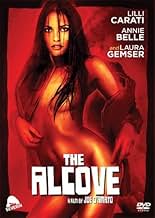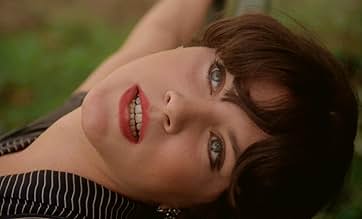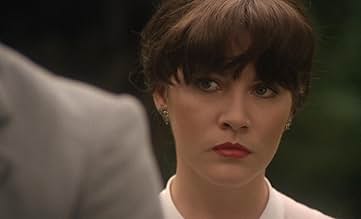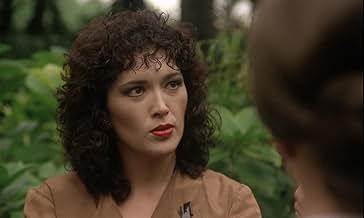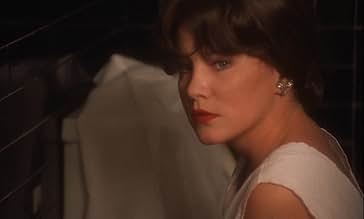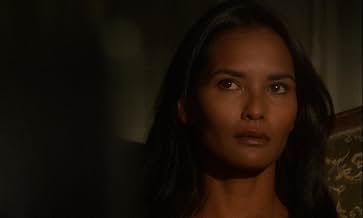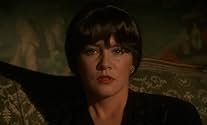Un soldat anglais rentre à la maison de la guerre des Zoulous avec la fille d'un roi tribal comme son esclaveUn soldat anglais rentre à la maison de la guerre des Zoulous avec la fille d'un roi tribal comme son esclaveUn soldat anglais rentre à la maison de la guerre des Zoulous avec la fille d'un roi tribal comme son esclave
- Réalisation
- Scénario
- Casting principal
Histoire
Le saviez-vous
- AnecdotesThe credits claim the screenplay is based on a novel by a Judith Wexley. Several researchers have said they could find no trace of this novel, and it apparently does not exist.
- GaffesThe movie is set after the Anglo-Zulu war of 1879 when the British imperial and colonial forces invaded Zululand, a war which spanned for six months. After this war, the English soldier Elio returns to Italy where he now lives. But clothes worn by the characters match the 1920s and 1930s better than they do the 1870s. Among Elio's possessions is a car. According to a movie car database this car is a Lancia Augusta which was in production between 1933 and 1936. Also, the family listens to Italian fascist propaganda about "Il Duce", Benito Mussolini, on a 20th century radio set. The fascist Mussolini was in power from 1922 to 1943.
- Citations
Wilma: You hypocritical sow!
Alessandra: I love you too, Mata Hari.
- Versions alternativesWhen released in the UK in 1995 this title was cut by 1 minute and 45 seconds by the BBFC.
- ConnexionsFeatured in Il vizio infinito (1992)
Commentaire à la une
Joe D'Amato's 1985 film, "L'alcova," weaves a tale that combines the allure of eroticism with the complexities of human relationships against a backdrop of historical intrigue. Set in the aftermath of World War II, the narrative unfolds within the confines of a luxurious, yet eerie, mansion, where the lines between power, lust, and control blur seamlessly.
The story centers on Elio, a soldier returning from the war with an unexpected companion, a beautiful African woman named Zerbal. This unconventional addition to his household sparks a volatile dynamic with his wife, Alessandra, who is both fascinated and threatened by Zerbal's presence. The tension is palpable as these characters navigate their desires and ambitions within the opulent, but increasingly claustrophobic, walls of their home.
D'Amato's direction is characterized by his signature blend of explicit eroticism and dramatic tension. The film does not shy away from graphic content, which is portrayed with a raw, unapologetic lens. This explicitness, while integral to the story, often feels gratuitous and detracts from the potential for deeper emotional and psychological exploration. The erotic scenes, rather than enhancing the narrative, sometimes seem to exist for their own sake, serving more as a distraction than a complement to the storyline.
The performances are a mixed bag. Al Cliver, as Elio, brings a rugged charm to his role, convincingly portraying a man torn between his past experiences and his present desires. Lilli Carati, as Alessandra, delivers a performance that oscillates between vulnerability and steely resolve, capturing the essence of a woman grappling with her own identity and the shifting dynamics of her marriage. Laura Gemser's portrayal of Zerbal is both enigmatic and compelling, though her character is often reduced to a mere object of desire, which limits the scope of her role.
Visually, "L'alcova" is a feast for the eyes. The cinematography, with its rich color palette and meticulous attention to period detail, creates an atmosphere that is both lavish and suffocating. The mansion, almost a character in itself, exudes a sense of decadence and decay, mirroring the tumultuous relationships of its inhabitants. The use of lighting and shadow plays a significant role in accentuating the film's themes of secrecy and revelation.
The narrative, however, struggles to maintain coherence. The pacing is uneven, with moments of intense drama interspersed with languid, almost stagnant scenes. This inconsistency hampers the overall flow of the film, making it challenging to stay fully engaged. Moreover, the dialogue often feels stilted and overly theatrical, which detracts from the authenticity of the characters' interactions.
Ultimately, "L'alcova" is a film that tantalizes with its promise of erotic intrigue and psychological complexity but falls short of delivering a truly satisfying experience. It is a visual and sensory journey that is marred by narrative and character development flaws. The film's ambition to intertwine historical context with personal drama is commendable, yet it never fully realizes its potential.
The story centers on Elio, a soldier returning from the war with an unexpected companion, a beautiful African woman named Zerbal. This unconventional addition to his household sparks a volatile dynamic with his wife, Alessandra, who is both fascinated and threatened by Zerbal's presence. The tension is palpable as these characters navigate their desires and ambitions within the opulent, but increasingly claustrophobic, walls of their home.
D'Amato's direction is characterized by his signature blend of explicit eroticism and dramatic tension. The film does not shy away from graphic content, which is portrayed with a raw, unapologetic lens. This explicitness, while integral to the story, often feels gratuitous and detracts from the potential for deeper emotional and psychological exploration. The erotic scenes, rather than enhancing the narrative, sometimes seem to exist for their own sake, serving more as a distraction than a complement to the storyline.
The performances are a mixed bag. Al Cliver, as Elio, brings a rugged charm to his role, convincingly portraying a man torn between his past experiences and his present desires. Lilli Carati, as Alessandra, delivers a performance that oscillates between vulnerability and steely resolve, capturing the essence of a woman grappling with her own identity and the shifting dynamics of her marriage. Laura Gemser's portrayal of Zerbal is both enigmatic and compelling, though her character is often reduced to a mere object of desire, which limits the scope of her role.
Visually, "L'alcova" is a feast for the eyes. The cinematography, with its rich color palette and meticulous attention to period detail, creates an atmosphere that is both lavish and suffocating. The mansion, almost a character in itself, exudes a sense of decadence and decay, mirroring the tumultuous relationships of its inhabitants. The use of lighting and shadow plays a significant role in accentuating the film's themes of secrecy and revelation.
The narrative, however, struggles to maintain coherence. The pacing is uneven, with moments of intense drama interspersed with languid, almost stagnant scenes. This inconsistency hampers the overall flow of the film, making it challenging to stay fully engaged. Moreover, the dialogue often feels stilted and overly theatrical, which detracts from the authenticity of the characters' interactions.
Ultimately, "L'alcova" is a film that tantalizes with its promise of erotic intrigue and psychological complexity but falls short of delivering a truly satisfying experience. It is a visual and sensory journey that is marred by narrative and character development flaws. The film's ambition to intertwine historical context with personal drama is commendable, yet it never fully realizes its potential.
- MajesticMane
- 17 juin 2024
- Permalien
Meilleurs choix
Connectez-vous pour évaluer et suivre la liste de favoris afin de recevoir des recommandations personnalisées
- How long is L'alcova?Alimenté par Alexa
Détails
Contribuer à cette page
Suggérer une modification ou ajouter du contenu manquant


